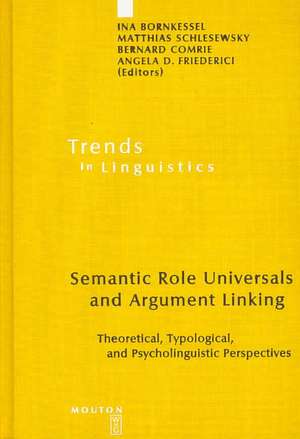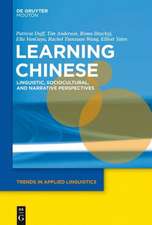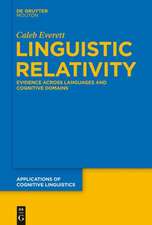Semantic Role Universals and Argument Linking: Theoretical, Typological, and Psycholinguistic Perspectives: Trends in Linguistics. Studies and Monographs [TiLSM], cartea 165
Editat de Ina Bornkessel, Matthias Schlesewsky, Bernard Comrie, Angela D. Friedericien Limba Engleză Hardback – 17 iul 2006
Din seria Trends in Linguistics. Studies and Monographs [TiLSM]
-
 Preț: 290.50 lei
Preț: 290.50 lei - 18%
 Preț: 1257.31 lei
Preț: 1257.31 lei - 9%
 Preț: 1194.88 lei
Preț: 1194.88 lei - 18%
 Preț: 963.07 lei
Preț: 963.07 lei - 18%
 Preț: 980.27 lei
Preț: 980.27 lei - 18%
 Preț: 979.01 lei
Preț: 979.01 lei - 18%
 Preț: 1213.26 lei
Preț: 1213.26 lei - 18%
 Preț: 1048.40 lei
Preț: 1048.40 lei - 18%
 Preț: 757.92 lei
Preț: 757.92 lei - 18%
 Preț: 985.33 lei
Preț: 985.33 lei - 18%
 Preț: 1049.84 lei
Preț: 1049.84 lei - 18%
 Preț: 1051.31 lei
Preț: 1051.31 lei - 18%
 Preț: 1325.08 lei
Preț: 1325.08 lei - 18%
 Preț: 749.82 lei
Preț: 749.82 lei - 18%
 Preț: 1118.87 lei
Preț: 1118.87 lei - 18%
 Preț: 1057.23 lei
Preț: 1057.23 lei - 18%
 Preț: 1054.18 lei
Preț: 1054.18 lei - 18%
 Preț: 763.17 lei
Preț: 763.17 lei - 18%
 Preț: 1193.49 lei
Preț: 1193.49 lei - 18%
 Preț: 1048.40 lei
Preț: 1048.40 lei - 18%
 Preț: 1022.79 lei
Preț: 1022.79 lei - 18%
 Preț: 959.82 lei
Preț: 959.82 lei - 18%
 Preț: 1324.53 lei
Preț: 1324.53 lei - 18%
 Preț: 1181.40 lei
Preț: 1181.40 lei - 18%
 Preț: 1118.68 lei
Preț: 1118.68 lei - 18%
 Preț: 1047.14 lei
Preț: 1047.14 lei -
 Preț: 225.66 lei
Preț: 225.66 lei - 18%
 Preț: 1153.07 lei
Preț: 1153.07 lei - 18%
 Preț: 1043.71 lei
Preț: 1043.71 lei -
 Preț: 123.91 lei
Preț: 123.91 lei - 18%
 Preț: 766.23 lei
Preț: 766.23 lei - 18%
 Preț: 761.34 lei
Preț: 761.34 lei - 9%
 Preț: 1468.97 lei
Preț: 1468.97 lei - 18%
 Preț: 774.99 lei
Preț: 774.99 lei -
 Preț: 230.95 lei
Preț: 230.95 lei - 9%
 Preț: 981.70 lei
Preț: 981.70 lei - 9%
 Preț: 735.87 lei
Preț: 735.87 lei - 9%
 Preț: 983.40 lei
Preț: 983.40 lei - 9%
 Preț: 683.82 lei
Preț: 683.82 lei - 18%
 Preț: 1314.61 lei
Preț: 1314.61 lei - 18%
 Preț: 1056.52 lei
Preț: 1056.52 lei - 18%
 Preț: 929.73 lei
Preț: 929.73 lei - 23%
 Preț: 807.39 lei
Preț: 807.39 lei - 23%
 Preț: 1116.62 lei
Preț: 1116.62 lei - 23%
 Preț: 1112.77 lei
Preț: 1112.77 lei - 23%
 Preț: 858.99 lei
Preț: 858.99 lei - 23%
 Preț: 1698.45 lei
Preț: 1698.45 lei - 9%
 Preț: 1694.03 lei
Preț: 1694.03 lei - 23%
 Preț: 1473.28 lei
Preț: 1473.28 lei - 23%
 Preț: 1474.46 lei
Preț: 1474.46 lei
Preț: 1915.88 lei
Preț vechi: 2488.15 lei
-23% Nou
366.65€ • 398.13$ • 307.98£
Carte tipărită la comandă
Livrare economică 22 aprilie-06 mai
Specificații
ISBN-10: 3110186020
Pagini: 371
Ilustrații: Numerous fig. and tab.
Dimensiuni: 163 x 236 x 32 mm
Greutate: 0.69 kg
Editura: De Gruyter
Colecția De Gruyter Mouton
Seria Trends in Linguistics. Studies and Monographs [TiLSM]
Locul publicării:Berlin/Boston
Notă biografică
Cuprins
Introduction
Section 1: Theoretical concepts
Chapter 1: Argument hierarchy and other factors determining argument realisation Dieter WunderlichChapter 2: Hierarchy mismatches and the dimensions of role semantics Beatrice PrimusChapter 3: Thematic roles - universal, particular, and idiosyncratic aspects Manfred Bierwisch
Section 2: Cross-linguistic aspects
Chapter 4: Experiencer constructions in Daghestanian languages Bernard Comrie and Helma van den BergChapter 5: Clause-level vs. predicate-level linking Balthasar BickelChapter 6: From meaning to syntax - semantic roles and beyond Walter BisangChapter 7: Meaning, form and function in basic case roles Georg Bossong
Section 3: Psycho-/Neurolinguistic considerations
Chapter 8: Semantic macroroles and language processing Robert D. Van Valin, Jr. Chapter 9: Thematic roles as event structure relations Maria M. PiñangoChapter 10: Generalised semantic roles and syntactic templates: A new framework for language comprehension Ina Bornkessel and Matthias Schlesewsky

















